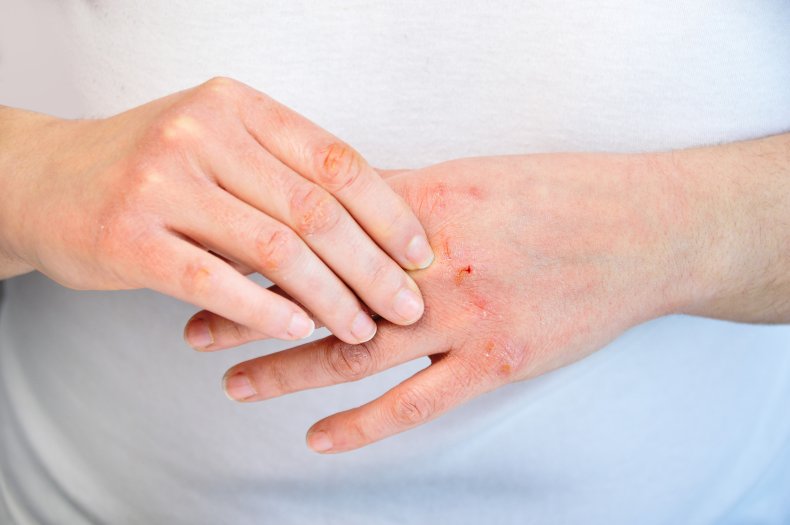A mother of three has been diagnosed with a rare, terminal cancer after putting her unusual symptom of itchy hands down to an oven cleaning product.
Maria Barry, 58, is from the U.K., and may only have six months left to live if she cannot access treatment for her rare bile duct cancer, which isn’t yet available on the country’s National Health Service (NHS).
The cancer affects the ducts between organs in the digestive system that carry bile, a digestive fluid used to break down fats. Barry’s dry, itchy hands were one of her symptoms, with other warning signs including skin or whites of the eyes turning yellow (jaundice), darker urine and paler feces than usual, and exhaustion, according to the NHS.
If found at an early stage, the cancer can be removed via an operation. However, in Barry’s case, it had already spread to her liver.
Barry first began experiencing cracked, itchy hands during the U.K.’s COVID lockdowns in 2021, and assumed they were the result of a new cleaning product she had been using.

iStock / Getty Images Plus
“I’d initially thought it was a reaction to a new cleaning product I’d bought to clean the cooker,” Barry told local newspaper the Leicester Mercury. “They were so itchy and I was getting aches and pains in my elbows, joints, everywhere, and I was constantly on the phone with the doctor.”
She couldn’t get a face-to-face appointment due to COVID restrictions, but was prescribed a series of potential treatments, ranging from steroid creams to UV treatments. Nothing worked.
“I just knew something was wrong. It had been months of trying different solutions and nothing had worked. Something had to be seriously wrong, so I demanded a CT scan,” she said.
On Christmas Eve, doctors told her they suspected she had a rare form of cancer and needed a biopsy, the first three of which were inconclusive.
“After the fourth biopsy, they confirmed they had found something malignant. It was so rare that the doctors said they needed to run further tests to find out what type of cancer it was.”
She was diagnosed with bile duct cancer in April. It had spread to her liver too.
“Doctors confirmed I had a 9cm mass known as intrahepatic cholangiocarcinoma and I was offered chemotherapy which started in May,” Barry said.
Because bile duct cancer is so rare, scientists don’t have a good estimate for its survivability. However, based on the small sample size of cases—only about 8,000 people are diagnosed with it per year in the U.S.—current estimates suggest only around 10 percent of people survive five years post-diagnosis.
Barry suffered so much from her chemotherapy that doctors took her off it, a move that would leave her with only three to six months to live. Her only other option, she decided, was a new gene therapy treatment that resulted in much fewer side effects to the patient.
“The gene therapy treatment that I need isn’t available on the NHS and costs £16,500 [$19,760] a month privately, so we are desperately trying to raise money using a GoFundMe page”, Barry said. “Anything that we can get will go towards saving my life. My kids all live at home with me and I don’t have grandchildren yet. I’m not ready to die, I’m fighting to live.”
The family has raised enough money on GoFundMe to support Barry’s new treatment until the end of July. However, they can’t afford further treatment as of yet.
“It feels so unfair and I’m struggling to come to terms with it, how money is standing in the way between me and the treatment I need to live. I don’t want to leave my kids, I’m not ready to go,” she said.
